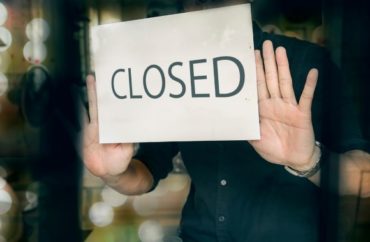
‘It’s going to be brutal across American higher education’
As the higher education bubble bursts, will it pop dramatically like a pricked balloon or will it fizzle out like an air mattress with a small hole?
It looks like the answer has become clear — the higher ed bubble is popping, slowly but surely.
Over the weekend, CBS This Morning featured a segment titled “Why more houses of higher education are shutting down.” It focused on how nearly a half-dozen colleges in the New England area have closed over the last year or so: Green Mountain College, College of St. Joseph, Southern Vermont College, Atlantic Union College and Newbury College.
An education expert told CBS it’s just the tip of the iceberg.
“I think 25 percent of schools will fail in the next two decades,” said Michael Horn, an expert on education trends. “They’re going to close, they’re going to merge, some will declare some form of bankruptcy to reinvent themselves. It’s going to be brutal across American higher education.”
For the first time in 185 years there will be no fall semester at Green Mountain College. The school fell victim to trends in higher education that could soon impact hundreds of other schools. @Brook has the story: pic.twitter.com/en8r8intvy
— CBS Mornings (@CBSMornings) August 31, 2019
Horn cited several factors, including the fact that more families are having fewer kids, which means fewer students to educate. But he also talked about the rise of faster, cheaper and more flexible and affordable programs.
Advancements in technology are certainly playing a role in how higher education is being reshaped.
In February 2019 the Chronicle of Higher Education in its special report headlined “The Rise of the Mega-University” detailed how online degrees are becoming popular, especially with older and non-traditional students.
“At a time when many colleges are struggling with shrinking enrollment and tighter budgets, Southern New Hampshire is thriving on a grand scale, and it’s not alone. Liberty, Grand Canyon, and Western Governors Universities, along with a few other nonprofit institutions, have built huge online enrollments and national brands in recent years by subverting many of traditional higher education’s hallmarks. Western Governors has 88,585 undergraduates, according to U.S. Education Department data, more than the top 14 universities in the annual U.S. News & World Report rankings combined,” the Chronicle reported.
It noted Southern New Hampshire’s online program enrolls 92,000 undergrads.
“While some so-called mega-universities have physical campuses, they’ve focused intensely on building online programs. They’ve emphasized recruiting working adults over fresh high-school graduates. They’ve embraced competency-based education, in which students earn credits from life experiences and from demonstrating proficiency in a subject. They market widely and vigorously, and lean into, rather than recoil from, some other common corporate practices and philosophies,” the Chronicle added.
Horn isn’t the only expert predicting higher ed is being reshaped.
Garrett Ward Sheldon, professor emeritus at the University of Virginia who has taught on political theory, American political thought, law, and religion, has also predicted it’s on perilous ground.
“My guess is that in 10 years, half of America’s universities will be turned into vocational-technical schools or closed entirely (or possibly turned into minimum-security prisons or drug rehab centers),” Sheldon wrote in a recent op-ed for American Greatness.
But Sheldon cites other reasons — political correctness run amok among them.
The writing is on the wall. A recent Pew survey found that “the share of Americans saying colleges and universities have a negative effect has increased by 12 percentage points since 2012. The increase in negative views has come almost entirely from Republicans and independents who lean Republican.”
Robby Soave at Reason makes this point: “It’s reasonable to question a system that takes young people out of the workforce at a pivotal time in their lives, saddles them with tons of debt, obliges them to learn a bunch of things they are likely to forget, gives them delusional ideas about the degree of protection from harmful speech to which they are entitled, and then churns out graduates who are overqualified for the jobs they find.”
With that, many families are turning elsewhere. Enter the “skills gap.” With the rising demand in blue-collar and so-called “new collar” jobs (think cybersecurity and digital design), more Americans are opting against college and instead choosing an education pathway that leads to a solid and well-paying job that doesn’t require going into tens of thousands of dollars of debt.
Nontraditional and vocational schooling combined with the booming online education industry means higher education is under the knife. No wonder the Democrats are clamoring so hard to offer free college. They know they’re losing their grip of the minds of young Americans who are no longer forced to sit inside classrooms and listen to professors drone on and on about white privilege and institutional racism.
MORE: Student-loan system is broken; these colleges give students a better deal
IMAGE: Nampix / Shutterstock
Like The College Fix on Facebook / Follow us on Twitter






Please join the conversation about our stories on Facebook, Twitter, Instagram, Reddit, MeWe, Rumble, Gab, Minds and Gettr.